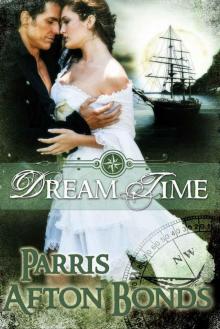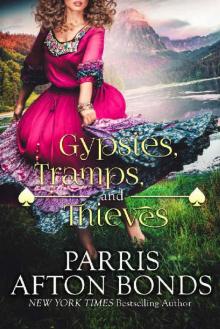- Home
- Parris Afton Bonds
Deep Purple Page 10
Deep Purple Read online
Page 10
Yes, yes, yes! Surely after weeks and months in the arms of her husband, she would forget Law. Tonight she would accept Jeremy’s proposal.
The baile was held in the home of one of Tucson’s first families, Don Esteban Ochoa, partner in the freighting firm of Tully & Ochoa. The large oblong parlor had been cleared of furnishings save the wooden benches girding the walls. Surrounding a table were clustered men eager to sample the fiery Mexican brews that were little better than turpentine. For the señoritas and their duennas a blackberry cordial and homemade peach brandy were provided.
Both Mexican and American men who were the elite of Tucson society had been invited—Bill Oury, an ex-Texas Ranger, Hiram Stevens, a wealthy merchant, and Charles Poston and Ross Browne, who had just returned from an exploring expedition of Arizona and the state of Sonora in Mexico. Representing the Mexicans were Jesus Elias, Don Solano Leon, and Ignacio Pecheco—all born in Tucson and now naturalized citizens by virtue of the Gadsden Purchase.
Three mariachis costumed in fine, gaudy velvets were already tuning their guitar, fiddle, and trumpet when Catherine and the Hugheses arrived. Like each previous guest who passed through the doorway, Catherine was pelted with cascarones, gaily colored eggshells filled with cologne or confetti.
“I hope you're prepared to dance all night,” Sam told her, laughing as he brushed the confetti from his carrot-colored hair. He ushered her and Atanacia to an unoccupied bench, saying, "It’s the men’s one chance to hold an Anglo woman in their arms, and I assure you, Catherine, they will not pass it up.”
"Or let you out the door until you’ve danced with every hombre here,” Atanacia added.
Catherine barely had time to remove her shawl and smooth her lace gloves over her fingers before she was besieged for the next dance—what appeared to be a mixture of the waltz and polka, though her partner, a short, thin soldier, seemed to be doing a variation of the Pigeon Wing.
By the time the sweating musicians paused for potent refreshment, she collapsed on the bench, panting with the exertion of the dancing. "And it’s only just beginning, not even midnight,” Atanacia said and laughed.
“I’ll never make it. My feet have been trampled by the cavalry and all their mounts.” She wriggled her toes inside her blue broche slippers to see if there was any feeling left. But oh, it was such fun. Her years as a wallflower were laid to rest that evening, and she meant to enjoy every delicious moment as belle of the ball.
She looked up to find several cups thrust before her at once. From among the admiring masculine faces, she picked out Jeremy’s and accepted the cup of brandy he offered. "I’ve missed your company,” she said, making no pretense at the art of flirtation.
“Then let me have the next dance,” he cajoled in a voice slightly slurred with pulque, fermented juice of the maguey cactus. “This is the first opportunity I’ve had to get near you.”
Atanacia, looking lovely in black lace, slyly nudged Sam. and the giant took his cue and asked his wife to dance, leaving room for Jeremy to sit next to Catherine.
She fanned herself and sipped at the brandy, listening all the while as Jeremy told her of the patrol he had been sent on in the Santa Rita Mountains. His words were light and joking, but his eyes fastened on her face with adoration. Nervously she turned her gaze to the dance floor, where Sam and Atanacia danced with nimble feet to the ranchero song “Cuatro Milpas.”
Suddenly Catherine’s gaze focused on the extremely tall man who came into her field of vision and moved toward her, blotting out all else. Law! She was unaware she breathed the name aloud or of Jeremy’s startled glance.
The sight of Law was like a blow to her windpipe. Her fan halted its lazy swishing. The brandy sloshed in her cup. She never expected to see Law again, especially moving among decent, civilized people. But there he was, standing before her, dressed in an all-black charro suit bordered with silver conchos. The thick yellow-gold curls framed his face in profusion, softening its angularities but not the sardonic smile.
“Miss Howard, I was sure you would have long since married by now,” he said.
Oh, the nerve! Any reply she could formulate would be extremely embarrassing to her and Jeremy.
“How are you finding Tucson?” Law went on easily with a smirk of amusement creasing his face.
“I find it much to my liking,” she said stiffly.
“And dancing?” He held out his hand, and she blanched at the scoundrel’s presumptuousness.
“I’ve enjoyed the dancing very much this evening,” she evaded.
“Good! Then you’ll dance the next one with me?”
It was really more a statement than a question, and she was about to refuse. But Jeremy, hereto respectfully silent, said, “I believe she’s promised the next dance to me.”
Only then did Law acknowledge the man. “Claramente,” he said, reverting to Spanish. Even his stance altered, though she did not know how to describe the change; it was more of a Mexican Caballero’s lithe, lazy movement. “But the dance, lieutenant, is a Spanish bolero. Do you perhaps know the steps?
"Ahhh, I thought not,” Law continued when Jeremy simultaneously shook his head and opened his mouth to protest. Then to Catherine, “It’s time you learned the bolero if you plan to remain m our hospitable Hispanic climate.”
Rather than make a scene, she nodded curtly. Her smile counseled patience from Jeremy as she handed him her cup, but his left hand went to the hilt of his saber even as he tossed down her cup’s remaining brandy.
She sighed; mixing the brandy with the pulque, Jeremy would no doubt be sick before the evening was over and spoil the fiesta . . . if it was not spoiled already, she thought, looking up at the tall blond who led her out onto the floor. She herself felt a pleasant warmth from the brandy.
Only the Hispanics in the room danced now to the repetitious and relentless melody of the lone trumpet, and she hung back. But Law would not release her wrist, instead drawing her into the small circle of dancers. “The steps are not that difficult,’’ he told her as he faced her. “Follow my movements—and remember, you are the temptress. You are dancing the bolero atop a table while the men gather to watch you.”
The slow, steady cadence of the music, the mesmeric quality of Law’s quiet, firm voice, could almost make her believe she was the temptress, the enchantress, as she tried to pantomime his movements. She, who had never danced before that night, was caught up in the music, forgetting all else, as she swayed and swirled. The music steadily accelerated in sound and tempo. Her taffeta gown flared above her ankles. Her arms entwined above her head. Now the guitar and fiddle joined in one long, gradual crescendo. The melody built inexorably, increasing the tension in the spectators.
But there were no spectators. There was only Law’s impassioned face before her. She danced for him, this Mexican who had the coloring of pure European ancestry.
The music crescendoed to an unbearable height to be broken by the instruments’ sudden shift in key to an abrupt end. The tension in the room was so strong that a breathless silence reigned until applause and shouts of Bravissimo! erupted from the spectators.
Glancing about her, she realized the other dancers had at some point retired from the floor, leaving her and Law to finish the sensuous performance. Her hands shot up to her flushed face. About her bare shoulders tendrils of loose hair feathered. Why, she must look like a common streetwalker!
She turned to Law, and the fear that she had made a fool of herself seemed to be confirmed by the quiet anger she saw in the sand-brown eyes. What must he think of her, a woman who gave her kisses so easily? And now this! “You’re a most unusual woman, Cate,” he said, as he led her back to the others. But she detected nothing of a compliment in his statement.
Whatever disapproval Sam or Atanacia may have felt certainly did not show in their smiles and congratulatory words. Jeremy’s gaze, but for the instant it crossed that of Law’s, burned with a passion that startled Catherine. In fact, all the men wore that same fervent gaze as they continue
d to claim dances from her. All but Law, who appeared occupied with some luscious Mexican widow.
Catherine fortified herself with several more cups of brandy to help her get through the rest of the long night. It appeared the revelers would dance as long as the musicians continued, which, she had been told, could well run into the breakfast hour. Her own strength was rapidly ebbing with the approaching dawn. So when Jeremy asked to escort her home, she acceded, not wanting to take Sam or Atanacia away from the baile.
Shades of orange and pink already illuminated the Rincon peaks when Jeremy and Catherine reached her jacale. “Catherine,” he said thickly, catching her by her arm when she would have opened the door, “I won’t be distracted from my purpose this time.”
“Let’s talk later,” she said gently. “It’s late—or rather, early.”
She opened the door, and Jeremy’s unsteady weight propelled them through the doorway. She recovered her balance, but Jeremy caught at the rickety table to keep from falling. “Jeremy, you really must go,” she said, moving to help him. Her head ached miserably.
“. . . just want the privi—-right to take care of you,” he mumbled. He unbuckled his belt with fumbling fingers, and the saber slid to the floor.
“Jeremy! You’re not going to sleep here!”
He wavered toward her. “You’re all ’lone, and it’s . . . not right.” His drink-fuzzed voice fell to a fervent whisper as his fingers clutched at her arms, accidentally tearing the lace sleeve. “You need someone, and I want it . . . it to be me.”
She was truly concerned now. She knew Jeremy meant no harm, but the situation was getting out of control. Where was one of her “protectors” now that she needed help?—no doubt still celebrating the New Year. “Jeremy, get out!” Oh, why had she drunk so much? She was not handling this right at all.
At the fury in her voice, he took a backward step and squinched his eyes as if to focus. “It’s that blond-haired Mexican you want, isn’t it?” He lunged at her. “It’s gonna be me . . . me,” he mumbled as his arms wrapped about her in a bear hug.
She tried to wrench free. Jeremy wrestled with her, stepping on her gown. She heard the rip as the two of them fell. They rolled over and over on the dirt floor. A portion of her mind was chagrined at the thought of the ball gown's being soiled. But another part of her mind was frantic with fear. His hands tore at the bodice. His cold, wet lips groped for her breasts. One hand pawed at her bunched skirts.
She shrieked, and his hand clapped over her mouth with smarting impact. With a violent shove, she shrugged loose and scrambled to her hands and knees. Her fingers touched cold metal. The saber! Her hand gripped the blade in mid-length. “No, Jeremy!” she gasped. She held the blade out before her, trying to warn him off. Still he half crawled, half lurched toward her. Then, incredibly, she knew not how, he fell upon the blade.
His gargled gasp echoed her own small one as the blade’s edge sliced her own palm with the force of his fall. She crouched over the suddenly inert body. Tears coursing down her face, she screamed and screamed.
CHAPTER 15
The cold February rain plip-plopped in the quagmire that had been Tucson’s main street. All up and down Calle de la Guardia the buildings’ canales, drainpipes, poured water from the flat roofs to add to the deluge that riddled the street.
Catherine could feel the mud weighting her skirts. She knew she should hurry on to Warner’s store to make her purchases— purchases that could have been postponed to another day. But she had felt herself going crazy in her small adobe hut. Besides, its roof leaked so badly that she was not that much worse off, standing as she was in the drizzle.
With the rain falling about her, she watched the men—and a few women—who queued up before the mud-brick building across the street. Such activity was unheard of, especially during the siesta hour. A chunky young Mexican woman in braids passed by Catherine, heading toward the line, and Catherine called out to her "Que pasa allá?”
The woman explained to her that agents were enlisting colonists for the Arizona Colonizing Expedition to Mexico. “They go to settle Hermosillo, in Sonora,” she finished and hurried over to take her place at the end of the line that now snaked past the Ciudad Cantina.
As if controlled by a puppeteer, Catherine's feet took her across the rain-sluiced street to halt behind the young woman. One by one the men in line turned to stare at Catherine as the word passed forward of the white woman waiting behind them.
She paid the incredulous stares no heed. Her bonnet’s feather drooped above her brow despite the tattered parasol she carried, and the rain plastered strands of hair to her neck and cheeks like seaweed. Still, as the line moved tediously forward toward the narrow doorway, she remained in her place, politely refusing offers by some of the men to let her move ahead.
She was a cornered animal. Since New Year’s Eve—the night she had accidentally killed Jeremy Rankin—she had little by little lost her students. Oh, even the alcalde, Aldrich, had condoned the killing, pointing out it was done in self-defense, thus saving her from the least of the punishments that could be brought against a murderer—a day at the whipping post. But that did not alter the attitude of the parents whose sons she taught. The number of her pupils dropped from twenty-three to eleven by midmonth. And by the first of February she had exactly four students left.
Sam and Atanacia had come to her defense, standing staunchly by her. “If the baby I carry was old enough, I would send him to your school,” Atanacia told her the third day after Jeremy’s death, when seven pupils were withdrawn.
Catherine had buried her face in her hands and wept for the first time since the incident. She wept for Jeremy . . . and herself. For her lost dreams of romance and excitement. She had never meant to take another’s life. Just as she had thought she would never have been capable of giving herself out of wedlock. She, Catherine Howard, who had too high moral standards! How low she had sunk!
Only the week before, Sam had tried to lend her money. She did not know who was more embarrassed, she or the red-bearded giant. She had, naturally, refused . . . as she had refused Sherrod’s offer of assistance that had come by letter a few days earlier.
Now her funds were almost depleted. She could, of course, marry. There were still a few loyal suitors, like Lionel, who had offered to defend her if she was indicted.
She knew the answer was, as always, Law. How could she be happily married when each time she ran into him she felt the magnetism of sexual attraction?
But perhaps away from the sight of him she could forget. The state of Sonora across the international boundary would be as good a place as any to forget him. More important, many Confederate families were flocking to Mexico now that the Union seemed to be winning the war. In Hermosillo she could find employment . . . and maybe eventually a husband.
At last she reached the doorway and stepped inside the small, darkened room. To the right of a makeshift desk of crates sat a swarthy old Indian. After Catherine’s pupils adjusted to the dark, she realized the old Indian was Loco. Those wrinkle-bound eyes never changed expression or betrayed that he recognized her. His gaze shifted from her to the mustachioed Mexican sitting behind the desk. Loco addressed the man, whom he called Tranquilino in a rapid-fire dialect of Spanish and Indian words that she had trouble following.
The Mexican looked at Catherine now. “You wish to emigrate to Mexico, señorita?” he asked in a gentle voice that did not quite hide his astonishment.
“Yes, of course. Are there any qualifications or conditions?”
Tranquilino looked to Loco. The old Indian shook his head in the slightest negative gesture. “I’m sorry, señorita,” Tranquilino then replied, “but we really have no place in the emigrant train for . . . ladies. Later, you see, we will establish families. But, uhh—we mainly are signing up men who can shoot and fight for now. You understand, the Apaches and Yaquis are marauding Sonora, and it will at first be necessary to set up camps and build a fort. These sorts of things.”
She wanted to leave Arizona. “You are taking other women,” she pointed out, trying to keep her voice as rational.
“Si, but these women are lavanderas—washwomen—and cooks. They can ride—and shoot, as well, if they have to. They are called—”
"Soldaderas," she said. “Yes, I know the term.” A camp follower. “But I can wash and cook and ride. And with practice I can learn to shoot a pistol.”
Tranquilino made one last attempt. “But you do not speak the different dialects. It would be very difficult to—”
She stamped her mud-caked foot and pointed to the men lined up behind her. “Three-quarters of these men here don’t speak Spanish, much less good English!” She whirled on Loco. “I have to go, Loco! I can’t earn a living here—I can’t support myself.”
“But, señorita," Tranquilino interrupted, “this is a delicate subject, but there are many men who will wish to—to make the love,” he finished lamely.
“I have killed a man.” She enunciated each word clearly so there would be no mistake. “I can protect myself.”
Tranquilino looked at Loco with a shrug.
“Maybe it is better this one goes,” the old Indian counseled.
Tranquilino closed his eyes with a sigh. "Bien, señorita. If you’ll put an X here—ahh, yes, I forgot, you are educated. Sign your name then. You'll need your own bedding and a change of clothing. Nothing more. You’ll be assigned a wagon and duties on the morning we leave—February 14.”
How auspicious! For the first time since New Year’s Eve she smiled.
I know you must think I've taken leave of my senses, Margaret dear, but for the first time in my life I'm doing something really adventurous. Unlike my brief period as a tutor for the Godwins, where I had a roof over my head and a guarantee of food and salary. I have no such assurances to carry with me on the undertaking I am about. I know not what tomorrow may bring. And in a way, it is a most liberating feeling. Perhaps I have more of my father in me than you or mother realized. I hope your next letter will bring better news of Mother’s health. In any case, you will have to find work to make ends meet, and for this I'm truly sorry. My love to you and Mother.

 Renegade Man
Renegade Man Sweet Enchantress
Sweet Enchantress Savage Enchantment
Savage Enchantment Mood Indigo
Mood Indigo Indian Affairs (historical romance)
Indian Affairs (historical romance) AT FIRST SIGHT: A Novella
AT FIRST SIGHT: A Novella The Maidenhead
The Maidenhead Dream Time (historical): Book I
Dream Time (historical): Book I Made For Each Other
Made For Each Other GYPSIES, TRAMPS, AND THIEVES
GYPSIES, TRAMPS, AND THIEVES Deep Purple
Deep Purple Tame the Wildest Heart
Tame the Wildest Heart LAVENDER BLUE (historical romance)
LAVENDER BLUE (historical romance)